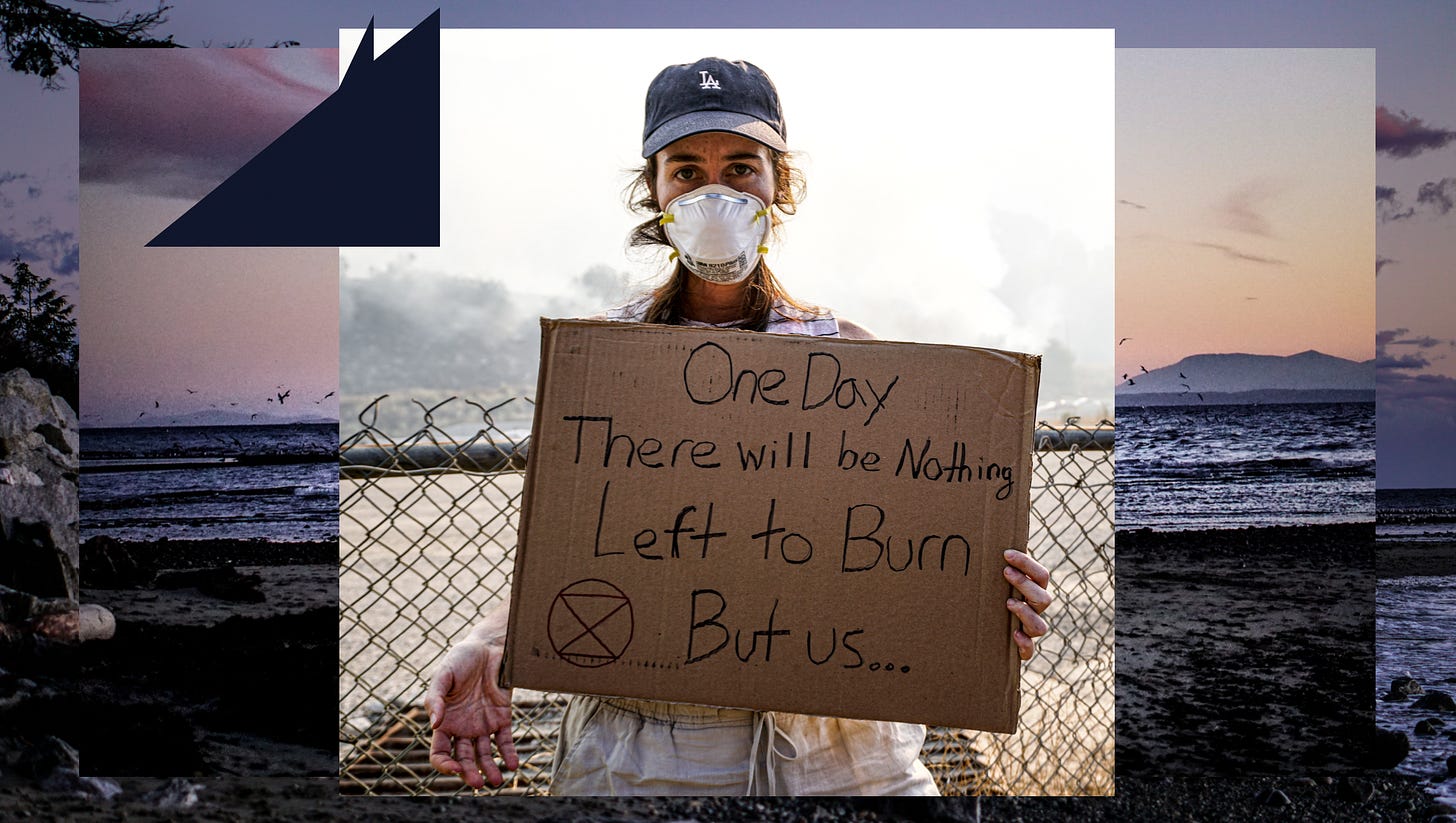It is November 10th, 2018, and I am sitting at a bus stop outside of the Lincoln Theatre in Yountville, Napa Valley, California. I am dressed for a film festival: shiny jewelry, chunky heels, lipstick. My “artist” badge dangles around my neck. The air is smoky, the sun orange-red. I’m waiting for a bus that will take me back to the town of Napa, to the filmmaker lounge where I will drink copious amounts of free booze and, basically, party all night.
We all know the analogy about the frog in boiling water, right?
Read the rest of We Need to Talk About the Evolution of Consciousness (Part One)
When do we stop living our lives the same way, cheers-ing and Instagramming as the world burns around us? Cut me off, bartender. I don’t want to be drunk and dancing while the ship sinks.
What will it take for us to become different? How do we evolve beyond our current paradigm, the one bent on extraction and destruction at all costs?
Though we know that the world is always ending and that the fixation on dystopia is a self-perpetuating aspect of whiteness, we also admit that we are at a unique precipice in human evolution. This precipice is the ongoing sixth mass extinction, fuelled by the advent of Anthropocene—the geological age demarcated by human influence.
Though many cultures, many “worlds” have ended before, the level of death and destruction currently unfolding is rare. It’s horrifying to witness, from our guilt-ridden, moralistic points-of-view, but it’s also possible that the reason humans exist at all is because of previous mass extinction events.
In research article “Lessons from the past: Evolutionary impacts of mass extinctions,” David Jablonski writes,
From an evolutionary perspective, extinction is a double-edged sword. By definition, extinction terminates lineages and thus removes unique genetic variation and adaptations. But over geological time scales, it can reshape the evolutionary landscape in more creative ways, via the differential survivorship of lineages and the evolutionary opportunities afforded by the demise of dominant groups and the post-extinction sorting of survivors. The interplay between the destructive and generative aspects of extinction, and the very different time scales over which they appear to operate, remains a crucial but poorly understood component of the evolutionary process.
The horror with this current extinction is that it’s human caused. But this judgement is firmly rooted in the human-centric belief that we have control and agency over the world—because we are separate from it. If we are not, in fact, separate from earth, then earth is, in part, enacting this extinction on herself.
Death is a function of evolution.
Whatever unfolds with this mass extinction, it’s not going to kill all life on earth. It may kill all homo sapiens, but it’s not going to kill life itself. Evolution will continue. But we want to continue, too. We want the planet to be livable for us and generations to come. So what do we need to do for this to happen?
What if we killed the concept of the human before the concept of the human kills us?
Many believe that humans are evolving into something new. You’ve heard it called Homo Deus, Meta Human, Homo Luminous, Future Human, and Transhuman. Everyone has different versions of what this evolution beyond might look like.
What I’m talking about is not uploading our consciousness to the cloud or merging with the computer, but instead embodying and consciously navigating the merge— the symbiosis and synthesis—that already exists.
What if simply acknowledging the fact that we are evolving will help us evolve faster?
Many things are ending, and from these endings many things will be born anew.
There is a future where we live in harmony with Earth, each other, and the technology we’ve brought to life. If we can release the human construct, and willingly embrace the next iteration of our evolution, I think the coming years (decades?) will be a lot less bumpy.
As the world continues to change rapidly around us, let’s intend to keep up with it. To be continued… but first, tell me—





To me the evolution of consciousness is about how we continue to collectively move away from primitive paradigms by acknowledging what our progress and technology has afforded us. For example, reimagining the concepts and values of pain and pleasure in a world where suffering for survival can be optional. I do however have to remember that different parts of the world are going to evolve at different “rates” due to sometimes vast cultural and historical differences, so is it possible to speak about the evolution of consciousness of homo sapien as a single entity?
https://open.substack.com/pub/tpulse/p/how-can-meaningful-shifts-in-human?r=5ojn8&utm_medium=ios&utm_campaign=post